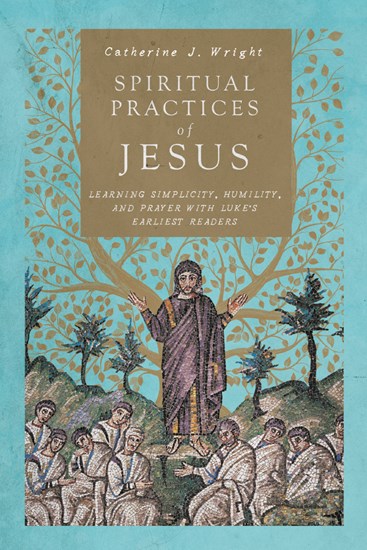
Spiritual Practices of Jesus
Luke's Gospel was written to transform. In its original context, readers would have seen a portrait of Jesus as an ideal teacher and king, able to shape his people through exemplary leadership. They would have come to the Gospel expecting to be changed for God's purposes through the imitation of Jesus' lifestyle and adoption of his teaching. When today's readers approach the text in the same way, they can be transformed too.
Spiritual Practices of Jesus explores Luke's portrait of the spirituality of Jesus, focusing on the themes of simplicity, humility, and prayer in his life and teaching. After establishing the likely thought patterns of Luke's first readers, Catherine Wright considers how Jesus models these three values and then explores how different readers have understood and employed key Lukan passages for spiritual formation, beginning with a first-century audience and tracing the reception of these texts in the ancient church.
Demonstrating a theological interpretation of Jesus' spirituality grounded in church tradition, this accessible book combines New Testament studies and spiritual formation to provide fresh insight into the biblical text. Wright invites readers to join with Luke's earliest readers in adopting ancient spiritual practices that still hold the potential to revolutionize our relationships with money, ourselves, others, and God. Luke's Gospel reveals that as we individually and corporately imitate Jesus, we live lives of greater authenticity, are oriented toward his kingdom, and are transformed by his manner of life.
"What does it mean to follow Jesus in the twenty-first century? Wright provides a stimulating account of what this might look like through a close reading of three of Jesus' primary spiritual practices in Luke's Gospel. She sets forth Jesus' spiritual practices through convincing exegesis, situating Jesus in his historical context, and through examining the reception of Jesus' teachings in the early church. Wright successfully shows how Jesus is the supremely good king and teacher who calls his people to a distinctive way of life. We need more books like this helping to point the way forward to how Jesus' practices—specifically simplicity, humility, and prayer—can shape the lives of would-be disciples of Jesus."
"With Spiritual Practices of Jesus, Catherine J. Wright has given a gift both to church and academy. Looking at Jesus' teaching and deeds of simplicity, humility, and prayer, she follows a similar pattern: she traces the theme in the Gospel narrative; then she contextualizes its practice within the views expressed in the larger Jewish and Greco-Roman environment of antiquity; finally, she explores the ways in which the teachings of the Lukan Jesus on simplicity, humility, and prayer were received in the early church. Wright is fully conversant with the pertinent primary and secondary literature, and along the way, she sprinkles examples from popular culture to present in bold relief the countercultural claims of Jesus. Pastors and lay Bible teachers will find here a kind of evangelical version of Ignatius's Spiritual Exercises, a treasure trove intended to encourage modern believers to adopt a simpler, humbler, and more prayerful way of life."
"There's a lot going on in this well-crafted book. Catherine Wright wants us to read Luke's Gospel as Christian Scripture. She wants us to learn habits of reading Luke faithfully from the early church. She wants us to take seriously first-century expectations for a narrative like Luke's lest we overwhelm the text with twenty-first-century assumptions. Above all, though, she wants us to be shaped decisively through encountering Jesus in Luke's Gospel. Focusing on the coherence of Jesus' life and teaching around spiritual practices, Wright invites us to apprentice ourselves to Jesus, our teacher and royal model. Here is a book you will want to read slowly, perhaps with others, taking in and becoming like the scriptural Jesus."